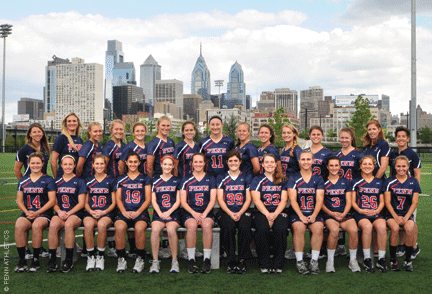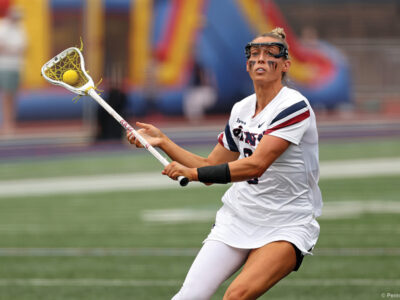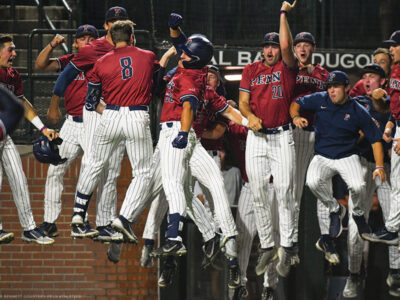By Dave Zeitlin

When the men’s golf team arrived at Galloway (N.J.) National Golf Club for the final day of the Ivy League Championships on April 29, head coach Scott Allen delivered a message. “Guys, we’ll ether play an incredible round and make one of the greatest comebacks ever,” he said, “or you’ll get to play with Scotty Williams during his final college round.”
A humble kid, Williams C’12 sort of chuckled when he heard that. Sure, he was the only senior on the team and was about to become the first Penn golfer to be named all-Ivy for four straight years. But was playing on the same course as him really such a big honor, he wondered? Besides, the whole greatest-comeback-ever thing sounded like more fun. So that’s what he helped the Quakers do.
In one of the most improbable and dramatic moments in recent Ivy League golf history, Williams drilled a two-foot putt in a playoff that sent Penn to an automatic berth in the NCAA tournament, extending his own college career in the process. The Ivy League title was the third in Penn’s program history, with the first two coming in 1998 and 2007.
“It was incredible,” Williams said. “It was such a treat to go out like that.”
What made the moment so improbable was that the Quakers had come into the final round of the three-day tournament sitting in fourth place and trailing by 16 strokes. Perhaps being so far behind was actually a good thing, as it allowed Penn’s squad—juniors P.J. Fielding and Colin St. Maxens, sophomore Max Marsico, freshman Austin Powell, and Williams—to play pressure-free golf. By the 13th hole, Williams heard rumblings that his team was right in the mix. And after a strong finish, the Quakers went into the clubhouse knowing they were battling only Dartmouth for the Ivy crown.
Constantly checking their phones for scoring updates, the Quakers figured out exactly what was needed for them to win the title, or tie Dartmouth and force a playoff. So when Dartmouth’s Peter Williamson, the tournament’s individual champion, missed a putt on the 18th hole, they all grabbed their golf bags and went to the range; for the first time in the 38-year history of the Ivy League men’s golf championship, there would be a playoff to determine the conference champion.
“At that point, we felt like we were playing with house money, to be honest,” Williams said. “We felt like we had the momentum. And we definitely had the skill. I felt like this was our strongest five-man team in my four years at Penn.”
It wasn’t until the third playoff hole that Penn and Dartmouth broke the deadlock, thanks in large part to a clutch birdie from Marsico. Fittingly, it was Williams, Penn’s only senior, who took the final shot, knowing his two-foot, hard-breaking putt for par would give Penn the title if he made it. Had he missed, the best-case scenario would be another playoff hole.
What was he thinking?
“I was telling myself that this is just your average two-footer—no pressure, just knock it in,” he said. “And I got over it quickly and just knocked it in. The more you think about something like that … the more likely you are to screw it up.”
When the ball dropped into the cup, his teammates mobbed him on the green, eliciting the kind of wild celebration you rarely see on the links. For Williams, perhaps the best part of the championship was getting the opportunity to finish his career at the NCAA tournament. Williams had earned a trip to the NCAAs once before, after winning the individual Ivy League title in 2010, but he knew going back with his teammates would be even more special.
“We did this as a team, and I felt like it was my duty to make the putt because my guys fought so hard to come back,” he said. “I never felt like it was about me.”
As a team, the Quakers didn’t play their best golf at the NCAA South Regional in Bowling Green, Kentucky from May 17-19, finishing in 13th place in the 14-team field.
But Williams believes that just getting to that stage—and playing against golfers who all have their eyes on the pro circuit—was an eye-opening experience that will help the Quaker program continue to rise. And with Marsico and Powell headlining a strong crop of returners, and Allen continuing to reel in national-caliber recruits, Williams has high hopes for the future of Penn golf—even now that he’s graduated and ready to begin his post-college life in Indonesia, where he’ll teach English for a year.
“We’re definitely going to win Ivies next year,” Williams said. “And then we’re going to come back with a vengeance at NCAAs.”

A sixth straight NCAA berth for women’s lacrosse—barely
In addition to the golf team’s thrilling championship, Penn enjoyed some more athletic successes over the past few months. Maalik Reynolds finished sixth in the nation in the high jump to earn his second straight All-America accolade; the softball team broke the program record for wins and captured the Ivy League South Division title on the strength of an Alexis Borden perfect game in a one-game playoff; and the gymnastics squad won both the Ivy Classic and the ECAC Championships.
But nobody experienced such drastic highs and lows en route to their success as the Penn women’s lacrosse team. And it all happened in the span of just a few hours.
The low came first: On May 6, the Quakers built a 3-0 lead in the Ivy League Tournament finals at Penn Park, before Dartmouth stormed back to earn a 6-4 victory and the conference’s automatic bid to the NCAA tournament. Despite having already claimed their sixth straight regular season league title—the longest-running such stretch in Division I women’s lacrosse—the Quakers did not think their 9-7 record would be good enough to earn an at-large bid to the lean, 16-team NCAA field. They thought their streak of five straight national tournament appearances, and their season, was over.
“I was thoroughly disappointed with my play,” said Erin Brennan W’12, one of just two seniors on the team. “I did not want that to be my last career game. So that Sunday I was definitely depressed, thinking that unless we were lucky and the NCAA gave us credit for our strong strength of schedule, we were finished.”
That night, Brennan and goalkeeper Emily Leitner C’12, the other senior on the squad, invited the rest of the team over to their off-campus house to watch the NCAA selection show. Crammed into their living room, eating leftovers from the post-game tailgate earlier that day, the players were nervous and reflective. They didn’t talk much.
Then came the high: About three-quarters of the way into the show, Penn’s name flashed on the bracket and the house erupted with cheers. The Quakers’ season was not over just yet.
“It went from a lot of unhappiness and regret at the fact that my career was over to pure joy about the fact I had one more game to play,” Brennan said. “There was a lot of hugging.”
The NCAA tournament, in all sports, signifies one of the ultimate achievements in college athletics, and the Penn women’s lacrosse team, under head coach Karin Brower Corbett, has now reached that pinnacle six straight years. Because of that sustained period of excellence, the Quakers came into the 2012 season with a goal of winning the national championship, something they’ve flirted with but never accomplished. Naturally, then, there was a feeling of disappointment when they dropped a 10-9 overtime decision to sixth-ranked Loyola in the first round of the NCAA tournament on May 13.
But for Brennan, that feeling soon subsided. The star senior attacker, who led the Quakers with 33 goals and 27 assists, still classified the 2012 season as a success, thanks in part to a sound 13-8 win over rival Princeton on April 25 that secured the program’s regular-season league title. In the end, it only made sense that her final game came on the grand stage of the national tournament, where she and her teammates have gotten so used to playing.
“After the loss to Dartmouth the week before, I’m so happy that we went out with a defeat I wouldn’t have regretted for the rest of my life,” said Brennan, who began working at Morgan Stanley in New York City following her graduation. “It was a game I thought was well-fought. [Loyola] came out on top but we all went out really hard.
“I was happy with how I played,” she added. “I was happy with the past four years.”
From the blog …
On June 7, gasps could be heard inside the Rubenstein Auditorium at Penn Medicine’s Translational Research Center. A sneak peak of the documentary Head Games was being shown, and each time a crushing helmet-to-helmet hit flashed on the screen, some people in the audience squirmed in their seats or let out an audible groan.
That’s probably the effect the producers wanted from their documentary on the ever-growing concussion problem in sports—a problem people in the Penn community know all too well.
Heavily featured in the film are Alan Schwarz C’90 (the New York Times reporter who’s written groundbreaking articles on the subject—and is featured in this issue’s “Alumni Profiles”), Owen Thomas W’11 (the former Penn football player who committed suicide and the first amateur football player ever found with CTE, a degenerative brain disease linked to depression and thought to be caused by concussions or sub-concussive blows), Eric Laudano (the head athletic trainer at Penn who was on the Ivy League committee that took measures to limit football head injuries), and a number of Penn doctors.
Following the screening, which was put on by Penn Medicine and Penn Athletics, a group of panelists, including Laudano, took questions from the audience.
According to panelist and executive producer Steve Devick, the film will have a “worldwide distribution” and is scheduled to hit theaters in September.
Dave Zeitlin C’03 writes frequently for the Gazette and oversees the magazine’s sports blog (penngazettesports.com).




